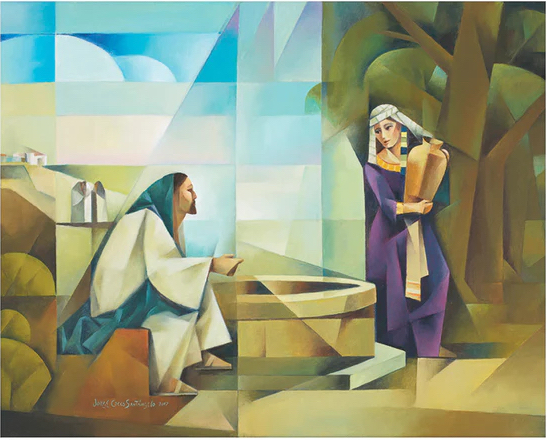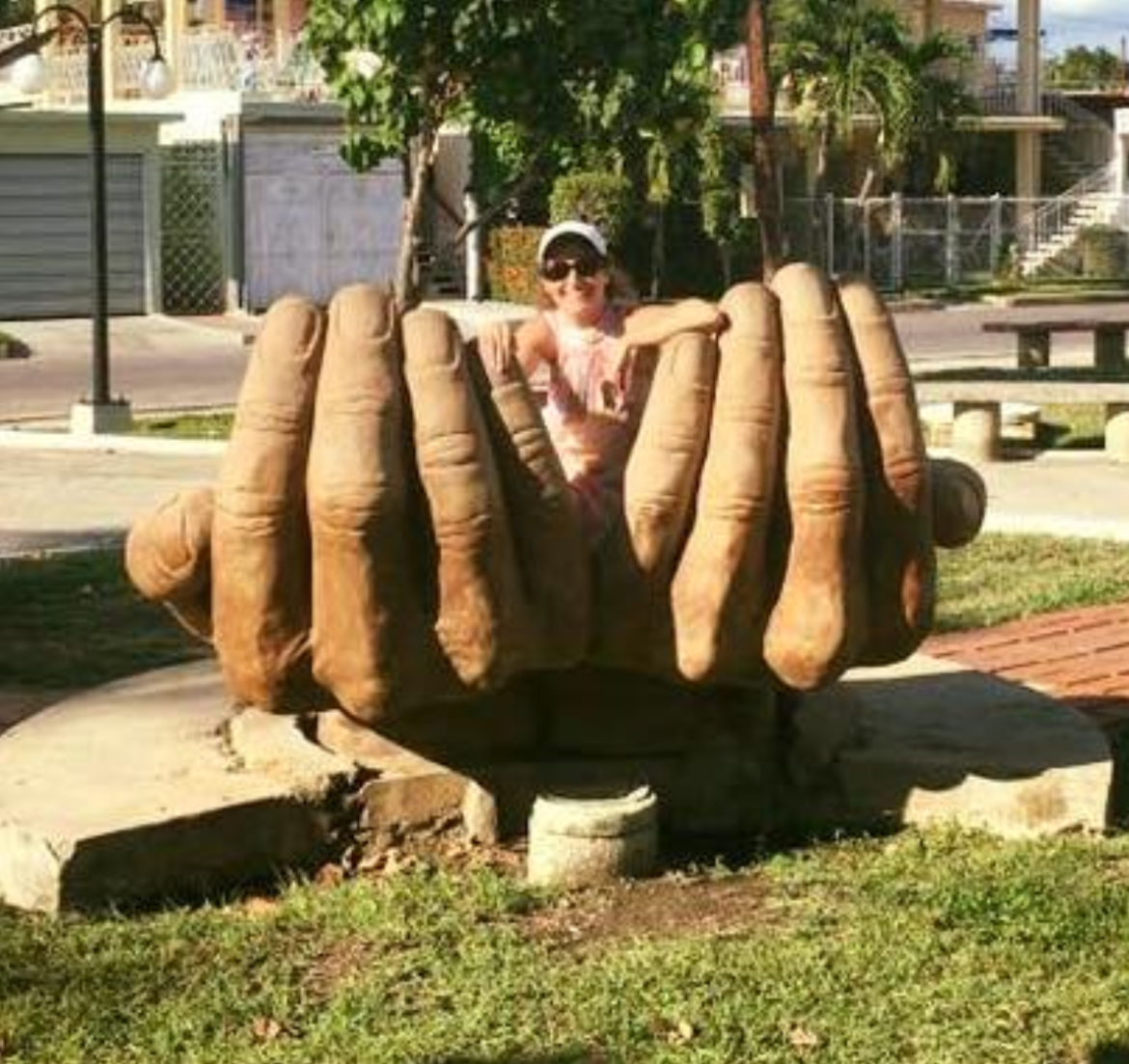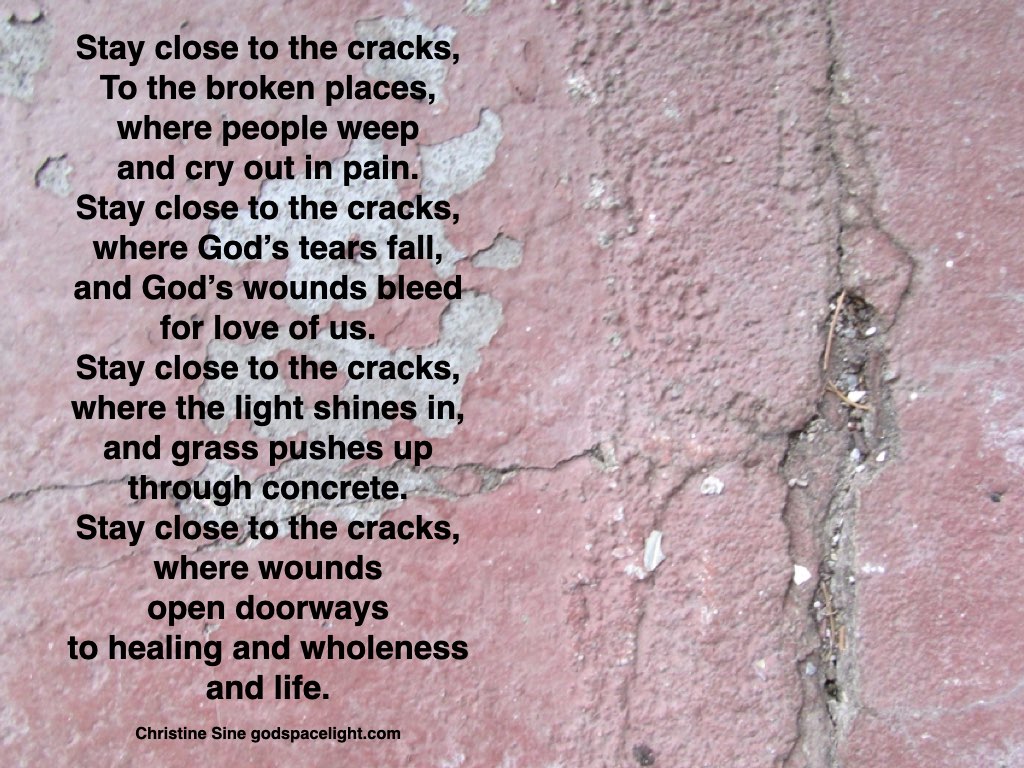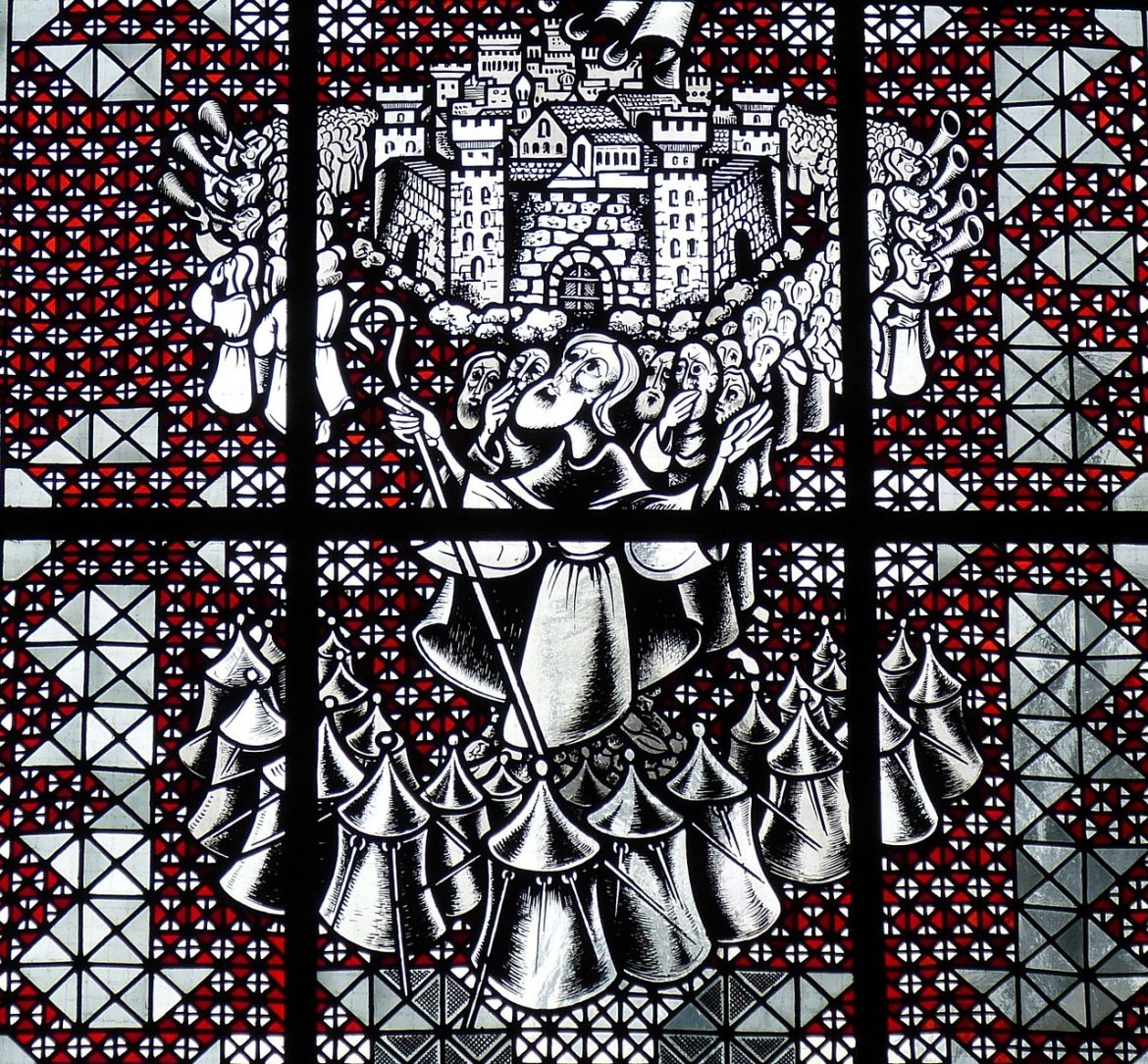This week’s gospel lesson is from John 4 …the woman at the well. Jesus chooses to go through Samaria on is way to Jerusalem. He was breaking down a wall just by going through this land because the Jews and the Samaritans were spiritual enemies. The disciples went to town to get lunch, but Jesus sat by the well and waited. Jesus waited for a person who needed the walls of her heart to be broken down.
Now Jesus learned that the Pharisees had heard that he was gaining and baptizing more disciples than John— although in fact it was not Jesus who baptized, but his disciples. So he left Judea and went back once more to Galilee.
Now he had to go through Samaria. 5 So he came to a town in Samaria called Sychar, near the plot of ground Jacob had given to his son Joseph. 6 Jacob’s well was there, and Jesus, tired as he was from the journey, sat down by the well. It was about noon.
7 When a Samaritan woman came to draw water, Jesus said to her, “Will you give me a drink?” 8 (His disciples had gone into the town to buy food.)
9 The Samaritan woman said to him, “You are a Jew and I am a Samaritan woman. How can you ask me for a drink?” (For Jews do not associate with Samaritans.[a])
10 Jesus answered her, “If you knew the gift of God and who it is that asks you for a drink, you would have asked him and he would have given you living water.”
11 “Sir,” the woman said, “you have nothing to draw with and the well is deep. Where can you get this living water? 12 Are you greater than our father Jacob, who gave us the well and drank from it himself, as did also his sons and his livestock?”
13 Jesus answered, “Everyone who drinks this water will be thirsty again, 14 but whoever drinks the water I give them will never thirst. Indeed, the water I give them will become in them a spring of water welling up to eternal life.”
15 The woman said to him, “Sir, give me this water so that I won’t get thirsty and have to keep coming here to draw water.”
16 He told her, “Go, call your husband and come back.”
17 “I have no husband,” she replied.
Jesus said to her, “You are right when you say you have no husband. 18 The fact is, you have had five husbands, and the man you now have is not your husband. What you have just said is quite true.”
19 “Sir,” the woman said, “I can see that you are a prophet. 20 Our ancestors worshiped on this mountain, but you Jews claim that the place where we must worship is in Jerusalem.”
21 “Woman,” Jesus replied, “believe me, a time is coming when you will worship the Father neither on this mountain nor in Jerusalem. 22 You Samaritans worship what you do not know; we worship what we do know, for salvation is from the Jews. 23 Yet a time is coming and has now come when the true worshipers will worship the Father in the Spirit and in truth, for they are the kind of worshipers the Father seeks. 24 God is spirit, and his worshipers must worship in the Spirit and in truth.”
25 The woman said, “I know that Messiah” (called Christ) “is coming. When he comes, he will explain everything to us.”
26 Then Jesus declared, “I, the one speaking to you—I am he.”
27 Just then his disciples returned and were surprised to find him talking with a woman. But no one asked, “What do you want?” or “Why are you talking with her?”
28 Then, leaving her water jar, the woman went back to the town and said to the people, 29 “Come, see a man who told me everything I ever did. Could this be the Messiah?” 30 They came out of the town and made their way toward him. JOHN 4
This woman was just doing what she did everyday. She came alone to the well to draw water.
She wasn’t expecting to have her life changed.
She wasn’t expecting the walls of her heart to be knocked down by LOVE.
What about you? What walls are around your heart these days? Walls that have been built because of fear, bitterness, anger or exhaustion. Walls built because you don’t feel loved or honored, or accepted as you are.
There are NO WALLS around the well of God’s love!
What walls have you built around other people? Maybe the people who don’t believe as you do, or look like you or vote like you….Are there walls you have built around these people that prevent you from seeing God’s image in them?
What places do you refuse to visit or go to because of these walls? How might Jesus be inviting you to go sit by the well and love the people who are there?
Jesus sees this Samaritan woman, really sees her and values who she is even in her brokenness . Jesus loves her and invites her to change and see things differently.
How is Jesus inviting us to see things differently today?
How can you know and believe Jesus really sees who you are and knows all you ever did but loves you anyway?
In the midst of everything, Jesus wont leave us thirsty.
Jesus wants to provide us with living water in the wilderness…in the desert of lent,
Jesus won’t leave us with the thick walls around our hearts.
In the Desert /wilderness of where you are, whether in peace or in crisis.
God is providing water. Jesus is knocking down walls that separate us from him and from each other!
We need to go to the well.
And Draw water like we always do.
Jesus is waiting for us to show up!
What will it take for you to show up at the well?
We celebrated International Women’s Day this week. So today I celebrate the first evangelist! The Samaritan Woman at the Well! I love that Jesus reveals himself as Messiah to her FIRST! A woman! And not a Jewish woman, but a Samaritan woman! Now that’s breaking down lots of cultural walls! There are NO WALLS at the Well!
ART: Jesus and the Samaritan Woman
by Jorge Cocco 2017
©lillylewin and freerangeworship.com
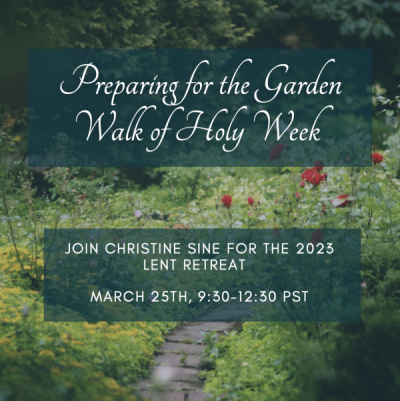 Preparing for the Garden Walk of Holy Week
Preparing for the Garden Walk of Holy Week
In the last few days of his life, Jesus moved from garden to garden from suffering to resurrection.
Join Christine Sine for a Lent retreat that reflects on this journey and prepares for the challenging week that follows Palm Sunday.
Click here to register! We are once again offering several price points to aid those who are students or in economic hardship
Reflection and poetry by Karen Wilk, visual art by Karen Tamminga-Paton
In Orthodox Christian traditions, Lent has been referred to as the bright sad season. I can relate to the paradox and tension in this description, especially this year as we are still carrying the grief of a number of significant losses that we experienced last fall. This painting invited me to ponder the struggle of holding on in the darkness while yet being aware of the brightness; in other words, to contend. Perhaps that is an integral part of what it means to engage the bright sadness of Lent. Perhaps to contend is to break down the walls in our own souls such that we can remain in the middle of the paradox and tension. Perhaps, Jesus too, had a lot of bright sadness with which to contend. And surely his contention broke down all our walls.
I invite you to study the painting and then dwell in the text:
Contend
I contend, I do, but I can barely hold on right now.
I just want to let go.
What would happen if I just let go?
Get a grip!
They say…
Look at the bright side
Think positive.
You can do it.
What if I can’t –
Be strong?
Hold on?
Contend.
Jacob contended-
Wrestling an angel late at night.
Abraham contended with the Lord
What if there be 50 righteous, 40 – 10?
Moses contended; I cannot speak.
Ruth at Boaz’ feet
David in ashes, might the child live?
Jesus contended WITH
the self-righteous, the proud and powerful
Jesus contended FOR
Tax collectors, lepers, the lame
Women, ‘sinners’, the blind and the shamed…
Jesus contended IN
a garden
With the Father and all our humanity…
With all our humanity,
We contend
The evil, the poverty,
The destruction, the war and desolation
The disease, despondency, and isolation
We contend
All the darkness and despair…
–the pain and loss that leave us raw and bare.
I contend, I do, but I can barely hold on right now.
While the world is dark and blue
And the sky is falling
Yet
Might I contend, if there be heavenly
glitter and gold
that without end, descends
And without me, transcends…
I wonder, whose hands really hold–
Perhaps they’re not mine
After all–
And I need not contend.
Perhaps Divine One attends
Amends, Defends…
Always
On behalf of His Created Ones
His Beloved, Spirit impends
With grace and favour commends…
CONTENDS
For us
With us—
I CONTEND,
GOD CONTENDS.
Would he contend against me with his great power?
No, he himself would heed me! Job 23:6 NABRE
Visual Artist’s Statement: Contend (ken tend’) v. 1 fight; struggle. 2 take part in a contest; compete. 3 argue; dispute. 4 declare to be a fact; maintain as true. Syn: cope, wrestle, battle; emphasizing the idea of trying heard and struggling against opposition.
I contend…through brush and paint, I contend. (72×36, acrylic and goldleaf on canvas, 2014)
 Preparing for the Garden Walk of Holy Week
Preparing for the Garden Walk of Holy Week
In the last few days of his life, Jesus moved from garden to garden from suffering to resurrection.
Join Christine Sine for a Lent retreat that reflects on this journey and prepares for the challenging week that follows Palm Sunday.
Click here to register! We are once again offering several price points to aid those who are students or in economic hardship
It’s looking more and more like spring here in Seattle, and we’ve gotten some much appreciated sun in the last few days. Sometimes it seems like time passes without my notice, but the sum of days looking back is many. I’ve been reflecting on the beautiful poem “At the River Clarion” by Mary Oliver during the last couple days, especially the stanza below:
“Of course for each of us, there is the daily life.
Let us live it, gesture by gesture.
When we cut the ripe melon, should we not give it thanks?
And should we not thank the knife also?
We do not live in a simple world.”
Each little gesture of our lives can be a moment for kindness, gratitude, and reflection. I found this theme also carried in St. David of Wales: Tending to the Little Things, by Elaine Breckenridge. Her writing tells the story of the life of a man whose simple daily actions spoke of his larger faith and what it offered to his community and the world.
Several writers creatively reflected on our Lent theme Breaking Down Walls. Christine’s Meditation Monday – Breaking Down Assumptions described how cracks can symbolize an opportunity to challenge our assumptions, remind us to look for those who have been excluded from society, and reflect on our own moments of brokenness and vulnerability. I thought Carol Dixon’s post Treasure in Clay Pots was a great follow up, as she incorporates several stories and extends the idea that perhaps our brokenness and cracks can be a source of beauty and significance. Breaking Things Down by Keren Dibbens-Wyatt explores what it means to pursue worthwhile change, and how we might reach out to the outcasts and ignored in our society.
I was very intrigued by Sheila Hamil’s post Breaking Down Walls, in which she includes an extended reflection on the interactions between Nicodemus and Jesus, and his movement from curiosity to faith. It also includes one of her original songs, which I always enjoy. Additionally, in her FreerangeFriday: Lenten Pilgrimage part 1, Lilly Lewin invites us to take a pilgrimage for Lent.
Coming up in the next few weeks is Christine’s next retreat, Preparing for the Garden Walk of Holy Week which will take place on Saturday, March 25th. Registration can be found here. We hope you will join her for this inspiring and revelatory time of scripture reading, quiet reflection and creative fun.
Grace and Blessings,
Rebecca Conner
Finding a shoe that fits, let alone comfortably can be a cumbersome task. Driving from store to store, trying countless styles. Does it fit better with a thicker sock? Will it serve me in all situations? Should I choose price over comfort?
Simply possessing a shoe rather than having one that fits has become a metaphor for defining the meaning of equity vs equality.
We have all heard discussions over the differences between equality and equity, however, trying to truly distinguish this from that, in this instance, can be a monumental undertaking. The Hebrew word for equity—mê·šā·rîm—encompasses such ideals as fairness, truth, and a certain universal order and levelness to life.
The King in his might loves justice. You have established equity; you have executed justice and righteousness in Jacob. (Psalm 99:4)
Here the Psalmist speaks of the King, the political entity loving justice in his might. God executes or delivers justice and righteousness. The difference is equity. When fairness is the goal, both equality and equity are needed to achieve it. Equity demands that what the law was intended to accomplish be considered more than just looking at what the letter of the law says.
What does this mean to us? What can we do in light of these ideals, that is so difficult to understand let alone implement?
Women have always cared for their families and taken on the burden of caring for what happens to other families. Equality says there must be food on the shelves available to everyone. It also means everyone should have an equal right to enter the store and buy what they wish. But not everyone has the money to do that.
For there will never cease to be poor in the land. Therefore, I command you, ‘You shall open wide your hand to your brother, to the needy and to the poor, in your land.’ (Deuteronomy 15:11)
Equity does not mean that if I can afford to eat Prime Rib, everyone should. It does, however, mean everyone should eat, and if I have more, part of my mission needs to be sure that they have the food to eat too. While politics wants to argue about what can be done in its might, we invite others to share a meal, donate and volunteer at the local food banks and for school lunches so no child goes hungry.
In the workplace, we support other women in lesser positions and promote their abilities. We vote for equal pay for equal work and take the time to have sometimes difficult conversations with the men in our lives, who may not understand why all this is so necessary, for no reason other than how they were raised. We speak the truth about these disparities. Equity perhaps is most important in the willingness to share information another might lack.
Oh, the solutions can seem so easy on the surface. Everyone should have equal opportunity to work at any job they desire. And we cheer. However, do they have equal opportunity to the education needed for the job they want? Student loans are one way the corporate and political worlds have attempted to provide equity. Does anyone think that is a perfect solution? And when we no longer cheer Band-Aid solutions, we ponder. Here is a good time to note these things in large portion are not women-only problems.
None of this is easy. Recently I watched the movie Woman Talking based on the book of the same name written by Canadian author Miriam Toews. This issue of women’s rights here takes on both matters of life and death and faith. As a few of the women work to find a solution for an entire community, we see how heart-wrenchingly difficult fairness can be. They struggle to decide both what is necessary and what is just. It is raw and it is hard to watch. And yet shouldn’t such discussions be hard? Being fair is not a simple task.
Equity is not a matter of things. Or changes in laws. It is a matter of the heart. It is Biblical. Do unto others as you would have them do unto you scriptural.
What women can do best to achieve equity is to do what they have always done when it comes to matters of justice. Speak out.
Abigail spoke out, coming face to face with David after her less than magnanimous husband Nabal refused to share his abundance with David’s troops. She spoke out against sheer might being a solution and appealed to David’s heart.
Queen Esther spoke out. By doing so she saved a nation.
Politics and might look for outcome-driven results. Biblical solutions look more to heart-driven results based on how we treat one another. There is a huge difference between the two.
One shoe does not fit all.
Dear Lord, guide us as we look for equitable decisions that serve all. Let us leave for our children a better world that looks for heart answers. Speak into our lives a wisdom that speaks to the rights of all your people. Amen.
 Preparing for the Garden Walk of Holy Week
Preparing for the Garden Walk of Holy Week
In the last few days of his life, Jesus moved from garden to garden from suffering to resurrection.
Join Christine Sine for a Lent retreat that reflects on this journey and prepares for the challenging week that follows Palm Sunday.
Click here to register! We are once again offering several price points to aid those who are students or in economic hardship
by Carol Dixon, music by Rev. Sheila Hamil
When I was at the Girl’s Grammar School in the early ‘60s we read the fables of La Fontaine and one that stuck in my mind was a story about an iron pot and a clay pot called ‘Le pot de fer et le pot de terre’.
One day an iron pot invited a clay pot to go for a walk with him. The clay pot was hesitant as he was afraid he might break if he went outside but the iron pot assured him that he would stand between him and any dangers so, with much persuasion, the clay pot reluctantly agreed and they set off side by side clomping along. The road surface was rather rough so the iron pot stayed close to the clay pot to protect him but before they had gone very far they bumped into each other on the uneven ground and sure enough, the clay pot shattered.
I’m not sure exactly what the moral of the tale was (or even if there was one) but the story has stayed with me for about 60 years!
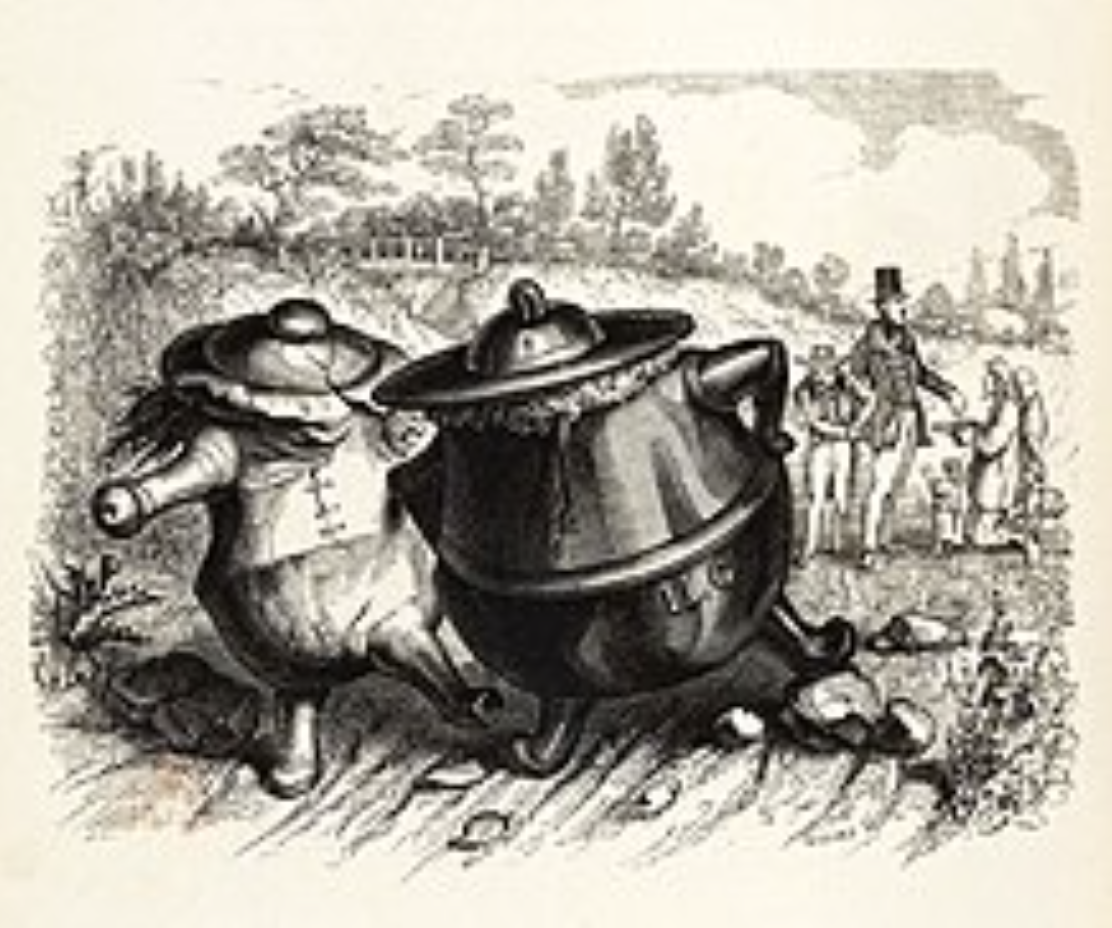
Image from Wikipedia
A much more uplifting folk tale from China goes like this. (Some versions include a perfect pot and a cracked pot)
Once there was an elderly lady who was so poor all she had was a cracked water jar. Each day she went to the river to collect water and by the time she got home the pot was half empty.
‘I feel really bad’ said the cracked pot sadly one day. ‘You have to keep going to the river for water because so much is lost through the crack.’
‘Don’t be sad’ said the woman. ‘Just watch the roadside and you will see something amazing’. Next time they went to fetch water the cracked pot looked but couldn’t see anything.
As they reached the river he said to her ‘I didn’t see anything – only the dry dusty road.’
‘Don’t worry,’ replied the woman. ‘Just keep looking’.
On the return journey the pot was delighted to see the verge was full of beautiful flowers. When they got home the pot asked the woman where they had come from when the other side was bare. The old woman smiled.
‘On the way back from the river water dribbles out of the crack in your side and so the flowers bloom.’ she said. ‘So you see even cracked pots have their uses.’
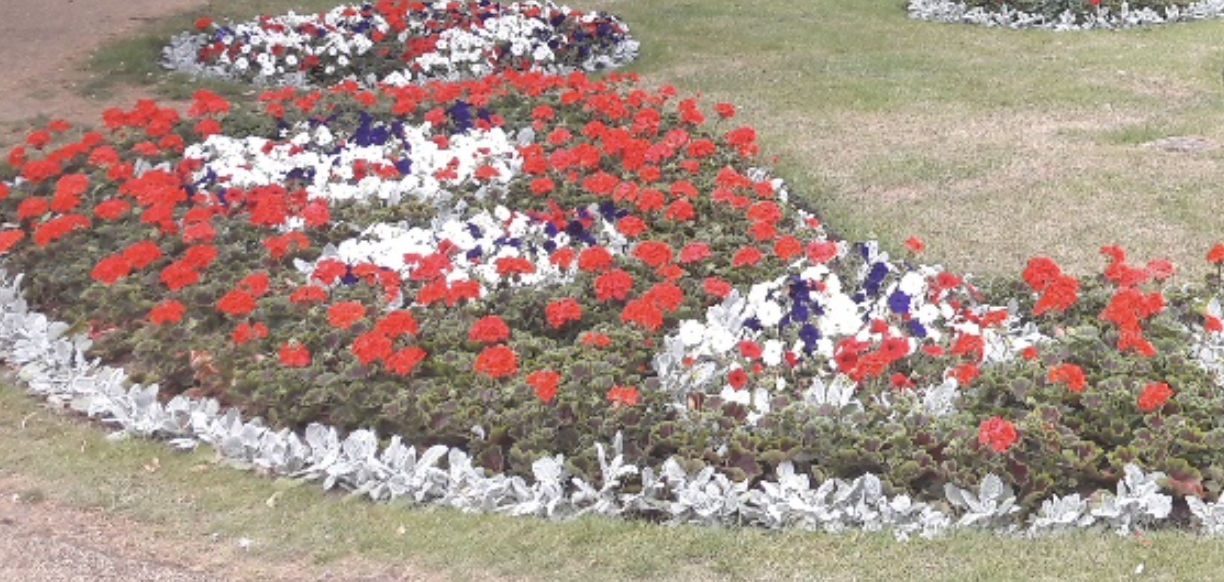
Photo by Carol Dixon
In many ways the story reminds me of Paul’s letter to Philemon where (in verse 11) Paul writes that one of Philemon’s slaves, who was useless to him since he ran away now lives up to his name, Onesimus (meaning useful) and been very helpful to Paul during his captivity. We don’t know why Onesimus ran away from his Christian master but somehow he ended up with Paul in prison and became a Christian. In our lives too there are times when disaster strikes and we feel we are ‘neither use to man or beast’ as my granny used to say. But God always has a use for us, whatever state we are in and as we invite Jesus into our lives (maybe for the umpteenth time) we find ourselves not only blest but become a blessing to others, perhaps in a very different way from what we had imagined.
Recently I have been rereading Margaret Silf’s beautiful book ‘Landscapes of prayer’ and in the section entitled ‘Garden’ she tells a lovely story about what she calls ‘The smallest ever walled garden’.
“Once there was a kindly noble lady who lived in a magnificent mansion and she often used to entertain guests. One day as she and a friend were taking tea together the fine China teapot slipped out of her hand and fell to the ground and the spout and handle broke off. Most people would have thrown it out but she loved that pot so she gave it a new form of life instead. She planted delicate flowers in it and it became its own ‘sacred enclosure’ reminding her and her guests that in our brokenness we can be even more lovingly tended and cherished than when we were whole.”.
Kintsugi bowl
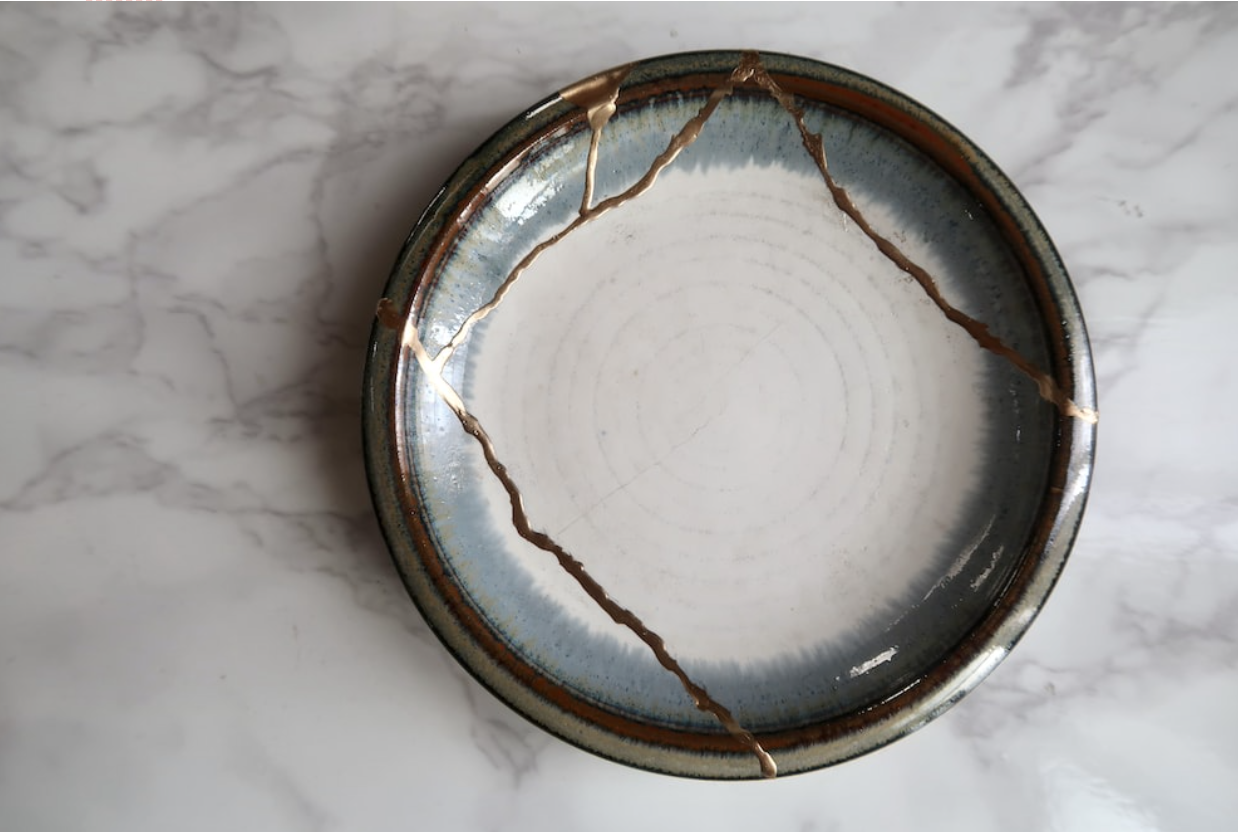
Photo by Riho Kitagawa on Unsplash
The Japanese have a wonderful way with broken pots called Kintsugi. Instead of discarding the object they put it together again and cover the cracks with gold paint turning what was disfigured into something beautiful. Paul’s second letter to the Corinthians chapter 4 says:
7 But this beautiful treasure is contained in us—cracked pots made of earth and clay—so that the transcendent character of this power will be clearly seen as coming from God and not from us. 8 We are cracked and chipped from our afflictions on all sides, but we are not crushed by them. We are bewildered at times, but we do not give in to despair. 9 We are persecuted, but we have not been abandoned. We have been knocked down, but we are not destroyed. 10 We always carry around in our bodies the reality of the brutal death and suffering of Jesus. As a result, the glorious resurrection life of Jesus may be seen in our human lives. [2 Cor 4 v7-10, The Voice translation]
A prayer:
Lord, we are weak vessels,
crude containers for your glory.
Yet we praise you
because your power
is radiant in weakness.
Lord, we are not worthy,
or great, by the world’s standards.
Yet we praise you
because your love
is revealed in unworthiness.
Thank you for choosing
weak people,
unworthy people.
Thank you for giving us
something to celebrate –
for filling us to the brim
with the new, invigorating wine
of your kingdom.
Lord of new beginnings
we praise you
because you our yourself out
for us,
you share yourself
with us,
and give us the intoxicating promise
that we may become
new wine for the world.
© Carol Dixon
One of my favourite songs of how that ‘intoxicating promise’ is fulfilled is ‘Water into Wine’ by Sheila Hamil. You can find it on YouTube – Sheila Hamil Lockdown Legacy along with many of her other lovely songs.
I hope you enjoy it as much as I do.
 Preparing for the Garden Walk of Holy Week
Preparing for the Garden Walk of Holy Week
In the last few days of his life, Jesus moved from garden to garden from suffering to resurrection.
Join Christine Sine for a Lent retreat that reflects on this journey and prepares for the challenging week that follows Palm Sunday.
Click here to register! We are once again offering several price points to aid those who are students or in economic hardship
by Christine Sine
The great science fiction author Isaac Asimov once said: “Your assumptions are your windows on the world. Scrub them off everything once in a while or the light won’t come in.”
As I reflect on this today it occurs to me that assumptions are like walls. They need to be broken down periodically so that we can reposition them, rebuild them and allow them to be totally reshaped. That in turn reminded me of Leonard Cohen’s powerful song “Anthem” His prophetic voice and challenging words are very appropriate for our world today. He affirms that there is indeed a crack in everything, a crack that often needs to be made wider rather than covered over. Cracks are not reason for despair but rather for hope because this is indeed how the light gets in.
In Eager to Love, Richard Rohr comments that St Francis of Assisi asked us to stay close to the cracks in the social fabric of our world. It is a thought worth reflecting on especially during this season of Lent.
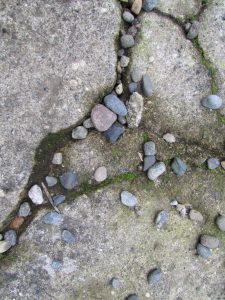
Everything in our lives and in our world has cracks, wounds and broken places that tell of pain and suffering. When we break down walls, cracks emerge. Sometimes we try to cover them over, attempting to seal them off from the light. But this only makes them fester and get worse.
Yet it is in the cracks, the broken places of our lives, where violence flares and pain cries out that healing also happens. When we acknowledge imperfections and the pain they cause, we take the first step towards wholeness. It is into the cracks that light can shine and water can seep. It is in the cracks in the concrete that seeds can lodge, germinate and take root. And as green shoots reach for the sky, the crack enlarges, the concrete crumbles and what was meant to live and breathe thrives once more.
What is your response?
Sit quietly in the presence of God, allowing the love of the holy and ever present One to wash over you. Read through the prayer above several times. What cracks in your world, what places of woundedness and vulnerability that give you ongoing pain come to mind? In what ways have you tried to cover these over, perhaps with a facade of laughter or with a semblance of respectability? Are there ways you respond, perhaps with fear, or anger or intolerance that show these are festering? Perhaps there are things you need to confess or seek forgiveness for. Offer these up to God in prayer.
Now think of the light that has shone into those cracks. Where have you seen glimmers of God’s wholeness? What has it begun to give life to? Are you aware of green shoots emerging towards the sun? How could you nurture their growth and make help them to thrive?
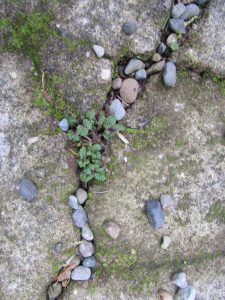
At our local mall recently I noticed that what was once a solid concrete slab of parking slots has now been transformed. The pavement (imagine wall) had been broken down. Deliberate “cracks” have been added between the rows of cars – small gardens that channel the water into the topsoil and down into the water table are thriving. The rain no longer creates a flood of water that overflows the drains and clogs the waterways.
Sometimes when we stay close to the cracks we realize that they need to be nurtured and strengthened to rebuild the fabric of our lives and our society. And as we nurture these it is not only the surface life that thrives but it is the deep wellsprings of the water table that flourishes too.
What is your response?
Read through the prayer above again. What slabs of pavement are you aware of in your life and society that need to be broken up with gardens? What walls have you broken down then reconstructed? Is there something the spirit of God is prompting you to do that could help accomplish this?
Now listen to the song below and allow the spirit of God to stir your imagination. Is there another response God is asking of you?
Photos by Christine Sine
 Preparing for the Garden Walk of Holy Week
Preparing for the Garden Walk of Holy Week
In the last few days of his life, Jesus moved from garden to garden from suffering to resurrection.
Join Christine Sine for a Lent retreat that reflects on this journey and prepares for the challenging week that follows Palm Sunday.
Click here to register! We are once again offering several price points to aid those who are students or in economic hardship
Presented with the image of faith breaking down walls, one of the first things that comes to mind is the Battle of Jericho, won by an unlikely combination of perseverance, obedience and music. The Israelites needed no weapons beyond these to make the city walls of their enemy come tumbling to the ground. Sadly, of course, they did use their swords afterwards, but it was by faith that the barriers to victory were destroyed.
Christians who have won battles have often done so by obeying God with peaceful protest. Leaders like Reverend Dr. Martin Luther King and Josephine Butler understood the power of a righteousness that did not need to lift a weapon. Christians tend to be campaigners when it comes to fighting for social justice. We are in it for the long haul, because we understand that changing hearts and minds takes time, and the walls of these precious places will only break down and let in the compassion of Christ when they have been prayed for, and walked with and shown the glory and the music of God’s kingdom.
We are always showing the world what the alternative could be to the mess we are making.
The recent prevalence of focussing urgently and often vociferously on certain issues has been concerning to me. We seem to be looking for a fight and imagining that it is within our power to change a great deal quickly by raising our voices, not in prayer or music, not in impassioned, inspiring speech, or long, careful letter-writing, but in anger, in zeal, in self-righteousness, even in vitriol.
I am mostly bedbound these days as many of you know, so my main impression of this change comes from social media. I see people who love God leaving aside his methods and looking for quicker, more satisfying results. I see Christians virtue-signalling and boasting in things other than their weakness, and I see us acting largely as individuals instead of as a chorus.
I am concerned. “Social justice warriors” is a label many Christ followers seem eager to embrace. Good causes are surely what we are all about. Yet, Jesus spent precious little if any of his time protesting or petitioning, or urging people to support particular leaders. He simply loved. He certainly did not condone violence. The turning of the tables at the Temple does a lot of heavy-lifting here. My understanding is that this was a deeply meaningful act in the build up to his painful death, where he was given up entirely to the authorities.
Scripture urges us constantly to bless and deliver the poor, the sick, the needy, widows and orphans. Those on the side-lines, the discarded and the weak. These were also the ones, along with those labelled sinners, to whom Jesus showed the most compassion and grace in his time on earth. Now we seek different labels and are in danger of missing who the real outcasts are. We follow the crowd and the media when they tell us certain groups are disenfranchised or vulnerable, without thinking for ourselves, and our leaders go along with this.
We need to be wiser, dear friends. We need to stop running after cultural bandwagons. We need to remember some truths. That it is still the poor, the sick, the needy, the widows and orphans who need our help, of whatever colour or creed. That postmodernism and its fads and terminology do not speak for us nor determine what love is, and as far as I can see, end up dividing us more than uniting us.
Most of all, we need to remember that we should be helping and loving one another as a team and for the long-term. This is the thing that I find the strangest. That so many people want to be “history makers,” known for changing the world. This message rooted in individualism is foisted on us again and again. I see it all the time in children’s books now. Yes, it is good to be inspired by saints and those who fought for change. But most of us are not Dorothy Day or Mother Teresa, and they would be the first to say they would have managed nothing without God and without their supporters and sisters and brothers.
It can take a long time and much work to bring worthwhile change. Yes, we need to be giving to good causes and making informed choices. But most lasting good will come from prayer, as well as from electing (or being) good leaders and working for well-considered and planned legislation.
We have other callings to remember. Not all of us are Christ’s hands. Some of us are hearts, or eyes, some of us are here to pray, to love, to heal, to see, to create, to raise families as well as awareness. Some, even to speak loving correction to the Church in prophecy.
Activism is just a fashionable word for what we as the Church should be doing in our communities already. The kind I see online seems to be spoiling for a fight, raging at the status quo, instead of discerning the best way forward, being gently compassionate, or thinking in the long-term beyond our own small lives.
I see that we are too often seeking to offer fealty to flags and firearms, kings and countries, instead of rallying around the life of sacrificial love to which we are called.
Can we take a moment, now and then, perhaps, to tune our trumpets to heaven’s notes of grace before we fall in line to play the world’s songs? To look to our prophets for guidance? To step back from the walls the world tells us need to fall and ask God to help the scales first fall from our spiritual eyes that we might see as he does? To do these things before we act, and not rush in with the gall to think we have all the answers, instead nurturing the balm in our hearts that we might give out in good time as medicine to an ailing world?
 Preparing for the Garden Walk of Holy Week
Preparing for the Garden Walk of Holy Week
In the last few days of his life, Jesus moved from garden to garden from suffering to resurrection.
Join Christine Sine for a Lent retreat that reflects on this journey and prepares for the challenging week that follows Palm Sunday.
Click here to register! We are once again offering several price points to aid those who are students or in economic hardship
As an Amazon Associate, I receive a small amount for purchases made through appropriate links.
Thank you for supporting Godspace in this way.
When referencing or quoting Godspace Light, please be sure to include the Author (Christine Sine unless otherwise noted), the Title of the article or resource, the Source link where appropriate, and ©Godspacelight.com. Thank you!

